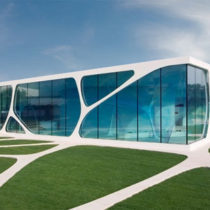Landscape Architecture for Landscape Architects › Forums › GENERAL DISCUSSION › “The ‘scape’ is killing the profession.”
- This topic has 1 reply, 28 voices, and was last updated 14 years, 6 months ago by
 lukad.
lukad.
-
AuthorPosts
-
December 29, 2009 at 6:03 pm #171833
 Zach WatsonParticipant
Zach WatsonParticipantI read a small portion of this and would like to have your thoughts on the subject.
The ‘scape’ is killing the profession. Landscape architecture has not elevated since the days of Olmstead. Caught between political correctness and a backwards/backyard perception, landscape architecture is NOT dead, but it’s pulse has scarcely managed to beat in recent years. We must drop the ‘scape’ to elevate. Remake ourselves, or at the very least, rename the profession: Land Architect. It’s time to step out of obscurity and into the sunlight, time to realize the profession’s true potential. The current environmental crisis presents a prime opportunity for landscape architects to fulfill a worthwhile, considerable and meaningful role in a society that must – like so many landscape architects are indeed capable of doing – thing BIG.
Some questions, Are you a Landscape Architect? Do you refer to yourself as such with the public, friends, and family? What proportion of us calls ourselves ‘landscape architects’, rather than architect or urban designer? If you do introduce yourself as an LA, how then do you avoid the inescapable ‘oh, you can do my backyard’ response?
is your best answer to the last question something like this? uh, I studied for four to five years (or in my case seven), but I’m pretty much useless when it comes to servicing your backyard needs, as my fees for plans, details package, and specification etc. are more than your entire budget. Plus my plant knowledge is mediocre, I can’t build it more can i get you someone to build it. How does that sound?
My architecture professor once said we should be able to sum up any thesis in a concise, cocktail party sentence. If it is wordy, boring, or unclear, a cold shoulder or blank stare will undoubtedly come at the end of your summary. The pertinent question for all LAs is this: In all honesty an in the spirit of brutal self-awareness, are we currently capable of achieving a clear and accurate cocktail party summation of our job description? Should we hold a competition, or focus the next Australian Institute of Landscape Architects (AILA) survey, an ascertaining the most concise, effective, on sentence description of a landscape architect?
-Joshua Zeunert ‘land architect’ p. 91
December 29, 2009 at 8:00 pm #171885 lukadParticipant
lukadParticipantChanging the terminology of a profession wont change society’s perception of it (Just look at Radioshack’s “The Shack” campaign; it’s still the same crappy, overpriced electronics store). In fact, the entire issue with landscape architecture is that there it’s not even on the radar for the average member of society; hence why people first reference the only landscapes they are familiar with when confronted with such a job title. Additionally, decades of environmental negligence and atrocities have led to a complete disconnect with the “natural” environment and the built environment. For this reason, people see little to no reason why landscapes must be designed or any intervention be necessary at all; other than their backyard that is.
The second issue with landscape architecture of course is landscape architects. This profession has long since had an extremely low self esteem. This is because landscape architects naturally compare themselves to architects. Since the dawn of man, humans have sought shelter to protect themselves from the natural environment. Now architecture seems to defy the laws of nature and demonstrate man’s supremacy over it’s surroundings. Architecture is a supreme form of art and design and is the epitome of man’s greatness. How do hills, tree placement, and micro-climates compare with massive buildings that literally cut the skies?
What landscape architects need to realize is that we are not architects. Nor are we any lesser or greater beings than architects. Architecture has long epitomized man’s dominance over his environment, and has since pushed man and the millions of species that also inhabit this earth to the brink of massive ecosystem collapses and complete systems failure. In the coming decades the world will need not only landscape architects, but ecological restoration practitioners, horticulturalists, and various other professionals to meet the needs of our rapidly changing environment.
When confronted with the question “could you design my backyard?” at your next cocktail party, why act offended? This individual is clearly trying to establish a dialogue with you. If your work does not involve residential projects, politely explain the various work that landscape architects do and briefly explain what you do on a daily basis. Lobbying for a change in the profession’s name wont ever fully explain what a landscape architect’s or any profession’s purpose is; that’s up to the person in question. If any landscape architect struggles to answer this question then maybe it’s time landscape architects start to ask themselves what they do in the first place anyway.
December 29, 2009 at 9:32 pm #171884 Joshua KParticipant
Joshua KParticipantif you’re going to hypothetically rename our profession, i think Exterior Architect is a far more suitable title for what landscape architects do.
December 29, 2009 at 10:04 pm #171883 Zach WatsonParticipant
Zach WatsonParticipantPersonally I’m not saying that we need to re-title our profession, I was simply looking at a blog about landscape architecture and urbanism and saw a magazine article on the subject. I don’t have the rest of the article, the first page of the article was the only thing posted. It was something that I had never head someone say before and I was simply curious as to what others think.
Personally I like the title of Landscape Architect, but he did make a few good points in the article of how difficult it can to be explain what we do in our profession. So I was simply curious as to what others thoughts were on the subject.
December 30, 2009 at 2:35 am #171882 Chad CrutcherParticipant
Chad CrutcherParticipantI simply say this if I think someone is just not quite getting it…
I do for the outdoors what an architect does for a building. I sometimes tell the architect where to put the building. I use plants, the sky, the ground, the views and built elements to define space and provide for the intended use just as an architect uses walls, ceilings, floors, furniture and decoration. I do my best to compose all this in an aesthetic composition that generates an emotional response appropriate to the place and its purpose.By the way, after I also suggest the fees are out of reach for the typical homeowner, I enthusiastically affirm that if the fees can be mutually agreed, I will be most pleased to design their backyard.
Do well doing good.
ChadDecember 30, 2009 at 4:39 pm #171881Mike G
ParticipantFrom the ASLA website: (In regards to the profession)
Who are their clients?
Residential design is the largest market sector (approximately 32 percent of billing hours). Most of that work consists of single-family homes, but also includes multi-family and retirement communities.
Three largest client groups, in descending order:
Developers
Private-home owners
Cities/municipalities.For smaller firms (four employees or fewer):
Private-home owners(stop) The public primarily associates us with residential work because that is what landscape architects primarily do. The words [Landscape Architect] perhaps are becoming a bit ambiguous, especially for those that hire ‘Information Architects’ that are familiar with the ‘Competitive Landscape.’
I can only call myself a Landscape Designer and while I’m working toward licensure I think residential design both in practice or conversation is a good way to educate the public on the many skills that LAs have and the contributions to society. Public perception and marketing are very important to me. If you market yourself as an Exterior Architect, Land Architect, or any other title do you think you would better stand out amongst the competition or get lost within it? And… how will that influence the public’s perception of our profession? For some this may be a very good way to stand out.December 30, 2009 at 9:41 pm #171880 Peter M. BoyleParticipant
Peter M. BoyleParticipantI like this. A lot. Those offended by someone elses misunderstanding of their profession are most likely supremely insecure about their own misunderstanding of their profession.
December 31, 2009 at 1:57 am #171879 Jonathan J. BobParticipant
Jonathan J. BobParticipantYes I can do your back-yard, what do you think needs to be done? I’ve been in primarily residential design/build for the past 27+ years so I’ve “done” alot of back-yards. And front-yards also residential developments, corporate buildings, parks, etc. Perhaps because of my residential slant or because I’ve developed a tougher skin, people’s misconceptions about what I do no longer bothers me. I often try to “educate” them as well as sell them my services. I’m proud of calling myself a Landscape Architect. If the residential work is not your field of “expertise” find an associate you can refer.
December 31, 2009 at 3:19 am #171878 Chad CrutcherParticipant
Chad CrutcherParticipantI agree with Peter’s comment. A lot.
January 1, 2010 at 12:24 am #171877Dennis J. Jarrard, PLA, CLARB
ParticipantAlways be proud of your profession and the work that you do. If you do not provide residential design then that is your answer to the question at your cocktail parties. I have worked in design firms providing both residential and commercial design. Personally speaking we received much higher fees on our residential work than the commercial projects. In the future, I hope to continue doing front yards and back yards and everything in between.
January 1, 2010 at 2:46 am #171876 ncaParticipant
ncaParticipantI think the root of the issue lies a little deeper than a particular title. I think there are a lot of people out there wondering about the validity of the profession. I wonder if I really have or will have the tools to do the kind of work I want to do and which is most important in my mind- having the greatest positive impact on society and the environment.
It often seems lately that landscape arch doesn’t offer all the promise of other disciplines with regard to range and scope of practice.
I also think it’s too peculiar to ignore the fact that this topic keeps re-emerging every few months.
January 1, 2010 at 7:27 pm #171875 Andrew Garulay, RLAParticipant
Andrew Garulay, RLAParticipant“I also think it’s too peculiar to ignore the fact that this topic keeps re-emerging every few months.”
It really is not peculiar at all. The real issue that drives the never ending urge to re-name, re-define, and re-market THE Profession is that it is so diverse that, like mixing several cans of different color paint, it turns to mud.
Each time the subject comes up people clearly try to define the profession from their own perspective. The difficulty is that the expansion of THE Profession has been through adding more diversity to it. The problem becomes trying to include each and every niche into the name, the definition, and the marketing without confusing what the other niches are all about.
“A rose by any other name ….” Billy Shakes a Pier
A recent thread was to come up with a short concise definition of “Landscape Architecture”. Most went on to either philosophic wonderment or long listings of conflicting niches that are allegedly encapsulated by every landscape architect.
Clearly, THE Profession is really a collection of a number of professions or sub-professions with only one consistency which can be concisely made – “the planning of the alteration of land”. That is just as vague as The Profession and not very effective.
An interesting observation that I have made is that there is not such a discussion or concern amongst “landscape designers” on their message boards and forums. That is rather funny when I think about it because “Landscape Design” should be vaguer than “Landscape Architecture” since all landscape architects are inherently landscape designers while not all landscape designers are landscape architects.
Perhaps it is time to split up The Profession to one degree or another. Philosophies and marketing strategies for one area may (and I would go so far as saying “they do”) conflict with those of other areas of landscape architecture. The conflicts arise from trying to appeal to too many agendas (all of which are valid, viable, and important) at one time and to attract new people to THE Profession. The result is that each is left rather flat one way or another.
I’ve sat in meetings with developers, unknowing of my profession (on CE team), rejecting the suggestion of bringing an LA onto the design team because “they work against us”, and “give to much the regulatory boards”. ASLA does not help that when they make publications stating that LAs should “Require open space and parkland preservation as a component of all public and private development, from small site-specific projects to regional land use plans” and “Require comprehensive transportation and utility planning as a component of land use planning, matching infrastructure capacity with current and proposed land uses”. These are good things and most of us do the best we can in doing what we can. But, clearly this is not helping appeal to the developers who have a choice of hiring LAs, OR CEs, or Architectural firms.Now we have a whole lot of recent graduates who were attracted to the profession to make a difference environmentally who don’t have jobs, some developers who are afraid of LAs in general, and a great deal of LAs who can’t figure out why developers are hiring only CEs and Architects to design their land so they want to rename, redefine, and remarket the profession to make it even more confusing.
We have to choose that we are a unique diverse profession and accept the ambiguity that goes with it, or to break it into specialty professions that can be coherently marketed and understood by the general public. I’m comfortable with either and very frustrated with those who think we can have it both ways.
Each firm should decide its own niche, philosophies, and agendas to attract clientel with mutual appeal and deter those who have different needs. When this is left to ASLA or other professional organizations we are faced with clientel whose opinion of us is shaped by others whether we fit that shape or not. This can be good as long as it is not taken too far. The problem is that the more they try to include in that shape, the less accurate it becomes for specific firms or individuals.
January 2, 2010 at 1:02 am #171874 ncaParticipant
ncaParticipantFor the most part Andrew I agree with everything you stated.
Though, in regard to land planning, la’s in many cases have only themselves to blame for some pretty poor ‘land stewardship.’ It shouldn’t be surprising that such prolific architects and designers as duany and alsop are casting stones in our direction. New urbanism is the antithesis of much of the land planning work la’s have completed in the last 30 years or more. It shouldn’t be a surprise I suppose that potential clients are looking to other disciplines for better ideas.
I think the heart of the matter though lies in the notion that landscape is inherently ‘fabric.’ I think a lot of la’s bring their work to the foreground, but I think in some cases this contradicts the basis of landscape.
January 2, 2010 at 2:22 am #171873 Andrew Garulay, RLAParticipant
Andrew Garulay, RLAParticipantTry adding a descriptive specialty in front of “landscape architect”. That should change the perception much more than ditching “scape”.
Try it out with what you do or study. Perhaps you might fit more than one.
I would expect that if I were to say that I am a “Commercial Site Landscape Architect” no one would ask me how many lawn mowers I have.
Residential Site Landscape Architect
Consulting Landscape Architect
Public Space Landscape Architect
Wetlands Restoration Landscape Architect
Campus Landscape ArchitectI bet we could come up with at least a dozen more without straining. None of which evoke thoughts of lawn mowers.
…. come to think of it, I can’t remember any such recent comment to me about lawn mowing when I simply say “landscape architect”. It either does not leave an impression or it does not get said. The only time I recall such a comment was when I first went off to school for landscape architecture and a high school friend asked if I was going to have a lawn care business like another mutual friend’s older brother had. ….I graduated high school 30 years ago and remember that very clearly, so I think if it had been repeated several times I would either not have remembered that incidence or would have remembered more of them.
Not all of our niches agree with other niches. It is easy to latch onto current philosophies being taught in school or practiced as being “the right ones” and practices that don’t follow to be “mistakes” or “bad stewardship”. Again, these are contrary perspectives that so many of us want to believe are either “in landscape architecture” or out. The reality is that they are all “in”.
A habit of exchanging what is reality for what we wish to be true is now an inherent practice in our culture. That is why we come up with these convoluted definitions of such things as landscape architecture that spend more words on explaining how noble and caring the profession is than what it actually does. We plan development folks. It is as simple as that. Each and every project whether it is a nuke plant or a wetlands restoration has compromises made to each and every value on the table whether it is to budget, environment, aesthetics, or what have you. Hopefully, we all share the goal of compromising each of these things as minimally as possible. Every party involved in any project brings different values to the table based on any number of different goals or perspectives that in the end define the benchmark for success of the project. Any other observer will see the success or falure based sometimes on a completely different set of values, rightly or wrongly.
Landscape architecture is obsessed with this need to own the high ground of values more so than any other design profession, it seems. I don’t know if it is an inferiority complex or guilt because we are manipulating nature much more directly. Whatever it is, it sure makes us look less professional at the least and sometimes almost childish.
We are land planners. The profession is not inherently devine. You can frame your life and practice toward divinity, but the profession is not divine on its own any more than any other. The idea to elevate the profession and ride it like a bus is what this is about. Why not just elevate ourselves and hope the profession follows us? If it does, great. If it does not, at least you did your part.
January 2, 2010 at 9:13 pm #171872 Austin Brook LuckettParticipant
Austin Brook LuckettParticipantThis is a really great question to consider. However, the reality is that a large portion of the profession revolves around large scale housing or commercial development(s). The Architects design the building(s), the engineers grade it and LA’s (or whatever you want to call it) design plans for the rest of the “landscape” features. Those plans go to “landscape contractors” to build. I’m afraid as much as we would like to re-invent what our role may be “a rose is a rose is a rose” probably applies here. I think another great question is: has the specialization in this process weakened each profession or strengthened them? The building architects also have the ability to provide these functions as well and they are hired before LA’s are, but most of them haven’t wanted to do it in the past. Will the current economic situation change that? The question as what may be killing the profession probably is something more than the word “scape” attached to it. I fear that we’ve done a great job of building things up in our own minds based on “loose” information and we now have the dubious task of facing reality. You are absolutely correct that BIG problems need BIG answers and Central Park is a perfect example of that. As long as we are “making a living” as LA’s then we will never achieve what F.L. Olmsted (check your spelling) did because he was a journalist and a park designer and NOT a Landscape Architect in the sense we think of today. I’m a little disappointed to hear your comment about your fees being more than the entire backyard budget and seems a little arrogant in a day and age when a large percent of LA’s are out of work. Additionally, I have yet to see any “urban design” in America that doesn’t revolve around major retail chain(s) and overpriced housing. Maybe 2010 is the time to face the facts instead of running from them? I hope so.
-
AuthorPosts
- You must be logged in to reply to this topic.

